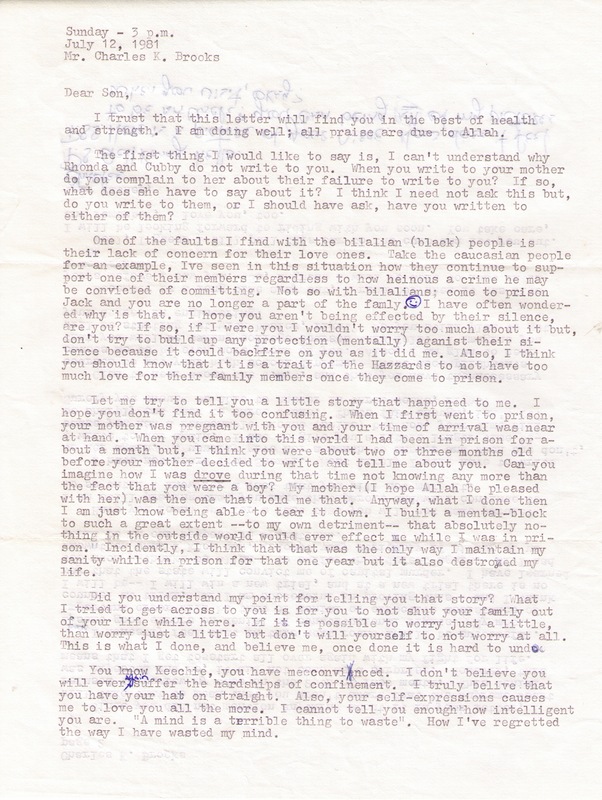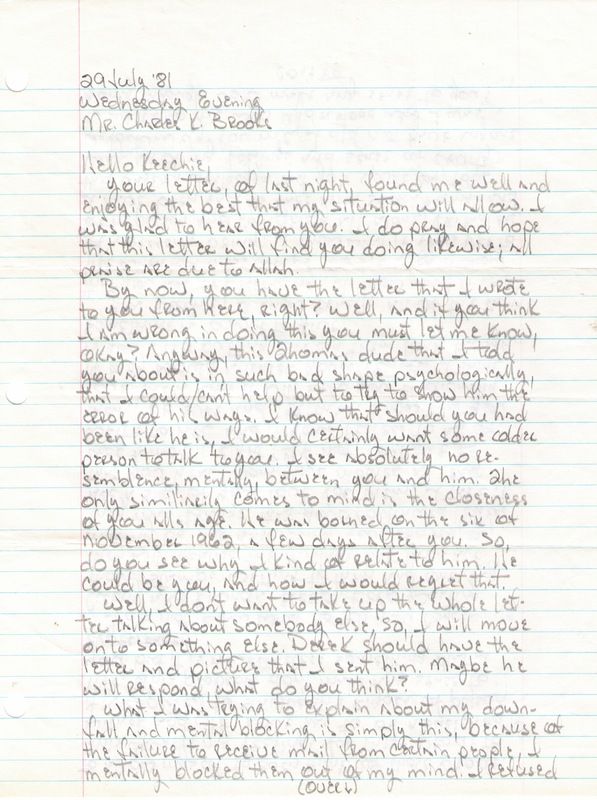Article 8 and the Case of Charlie Brooks Jr.
"Everyone has the right to an effective remedy by the competent national tribunals for acts violating the fundamental rights granted him by the constitution or by law." Article 8, Universal Declaration of Human Rights
Charlie Brooks Jr. was the victim of several abuses of human rights throughout his trial, prosecution and incarceration. This injustice culminated in his execution by lethal injection. Charlie was never able to address these abuses before a competent national court, as all avenues for appeal were not exhausted at the time of his punishment. In this letter to his son Charles, Charlie expresses his hope that he will be granted a stay of execution, explaining that he has been denied some of his fundamental rights. He explicitly mentions his lack of competent council, and that if he would be given a chance to go to trial yet again. This time he is assured that he would not be charged with capital murder. According to the oral history with Charlie’s other son Derrek,Charlie had educated himself on criminal law while prison, and could have served competently as his own council in a new trial. But Charlie was denied a chance to prove that his trial was unfair. His human rights were violated, so Article 8 of the Universal Declaration of Human Rights would ensure that he had a chance to prove himself innocent before the court. But this was not the case, for Charlie Brooks Jr.
Another letter to his son Keith, who he also addresses as Charles or Keechie, dated only a few days later, shows a continuity of Charlie’s hope that his execution will be overturned, even after being denied his chance to prove his innocence yet again. He informs his son that this time he will file a writ of habeas corpus, which would force officials holding him to bring him before a court and offer proof for why they are detaining him. If the court finds the reason negligible, he could go free. Charlie admits in this letter that though he was guilty of a crime, his trial and sentencing were unfair, and that his conviction should not have been that of capital murder. He argues that if his appeal is denied in the Supreme Court, he will go through the appeals process starting from the county level yet again. Though Charlie remained optimistic for the majority of the letter about his chances, he does say that if his execution will occur, he believes that it would be the “will of God”. This implies that he has at least considered that he will not successfully convince the United States justice system of his wrongful treatment and his innocence from capital murder. Charlie was not able to go through the appeals process fully as revealed in his son Derrek’s oral history. Derrek says that this is a direct result of court and prison officials wanting his father dead. Derrek explains that Charlie, with his education in law, was helping other prisoners appeal and go free by his council. He was a thorn in the side of law enforcement as a result, and Derrek suspects that this is the reason Charlie was unable to be granted a new trial. He believes that bias cost his father his life. If this is the case, Charlie’s right to seek compensation for his unjust treatment was stripped from him because of the animosity of a group of people meant to be preserving freedom and justice. Charlie Brooks Jr. may have committed a crime, but it is seeming ever more likely that he did not deserve to die.
by Mackenzie Lawlor
Derrek Brooks Oral History:http://av.lib.utexas.edu/index.php?title=TAVP:Derrek_Brooks_1&gsearch=brooks


